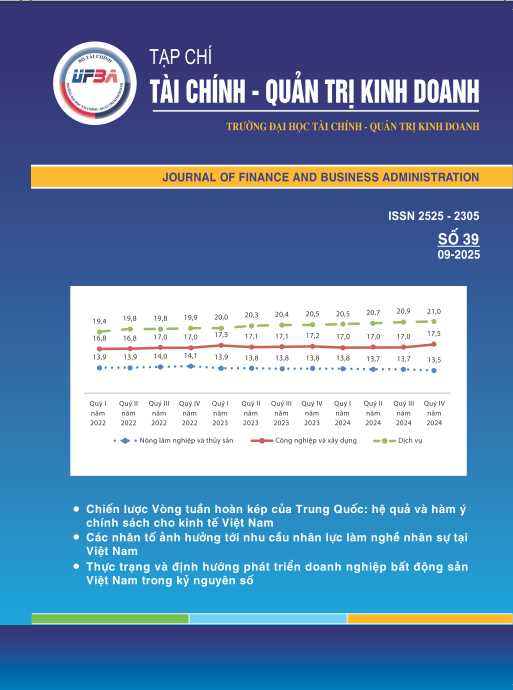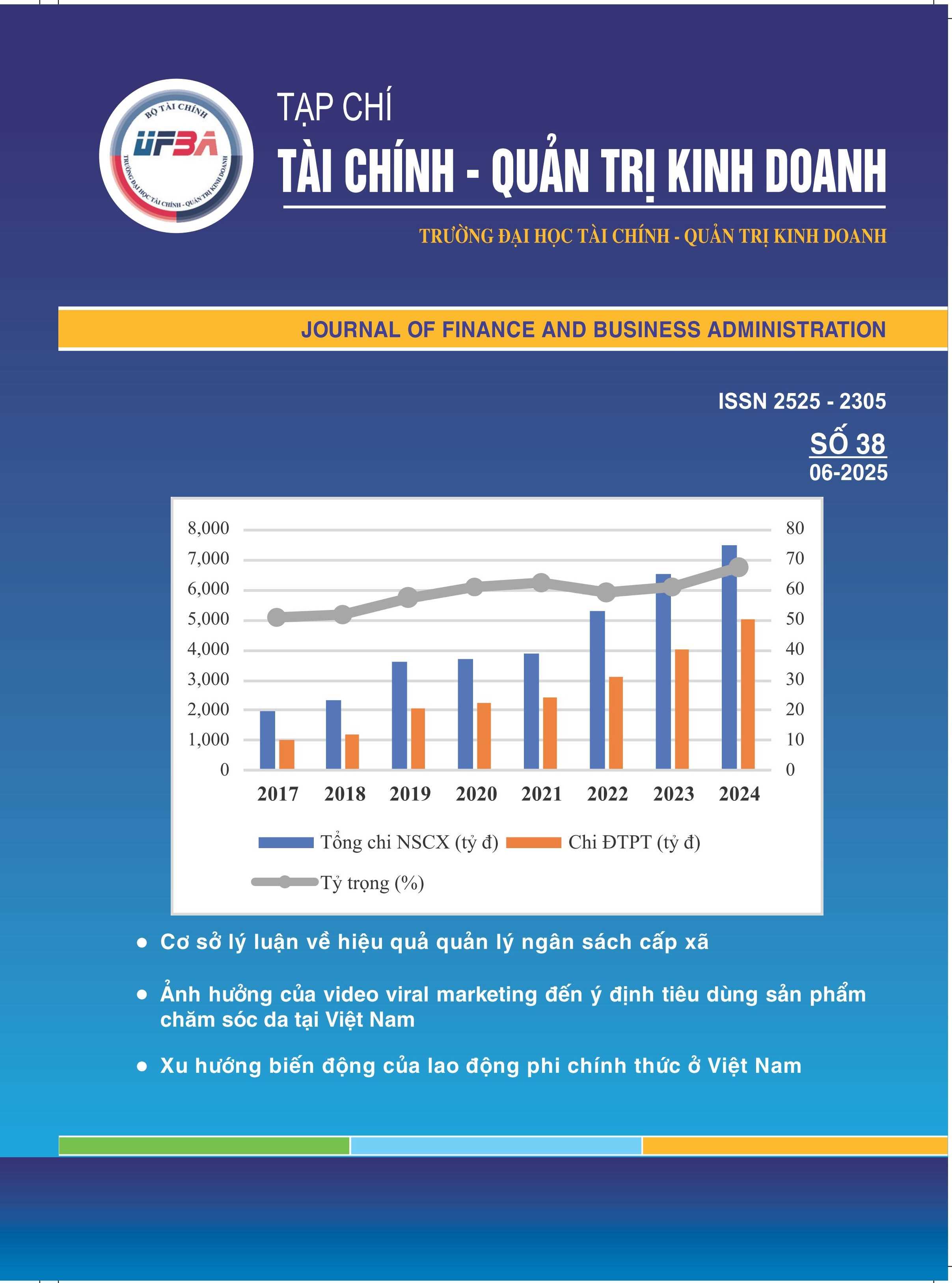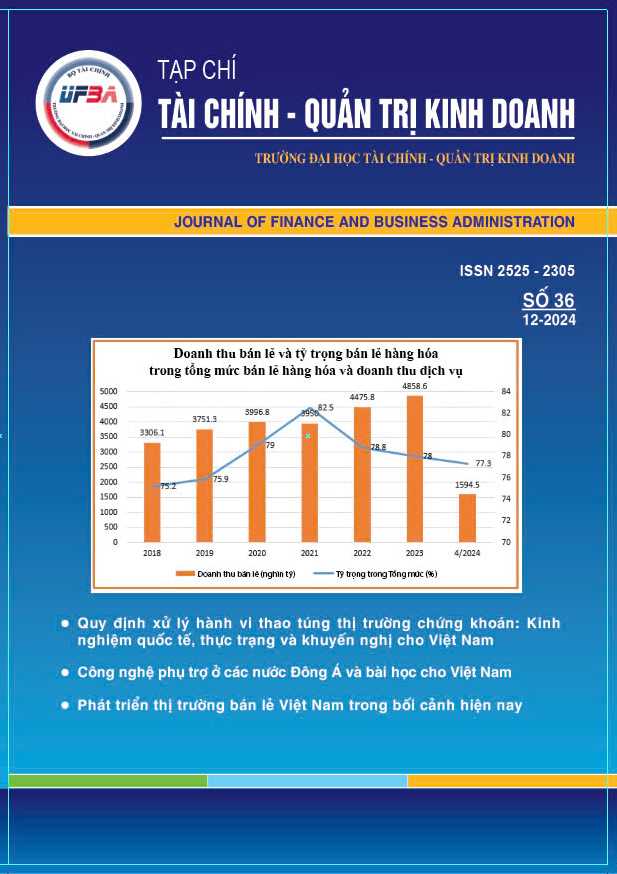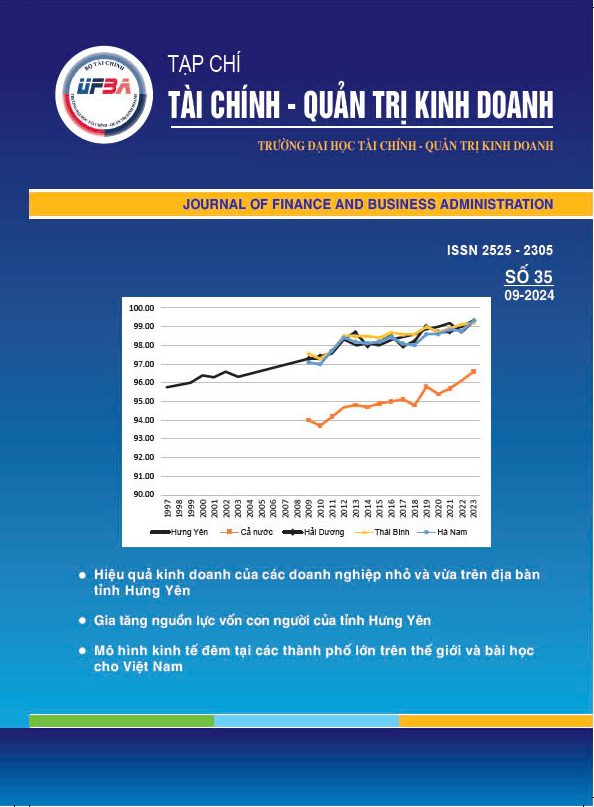JOURNAL OF FINANCE AND BUSINESS ADMINISTRATION, NUM 37.T03_2025
1. Sleep travel intentions of generations y and z in vietnam: The mediating role of attitude
Tran Minh Ha, Nguyen Ngoc Anh, Duong Ngoc Anh, Do Ngan Ha, Phan Bao Phuong Linh, Do Huong Giang
Sleep tourism has gained significant attention as a growing trend in the travel industry, driven by the increasing focus on improving sleep quality of tourists to enhance both physical and mental health. Therefore, this study investigates the relationship between perceptions of the benefits and barriers of sleep tourism and the intention to engage in it, with attitudes toward sleep tourism acting as a mediating factor. The findings through a survey of 415 individuals from Generations Y and Z in Vietnam reveal that perceived benefits positively influence individuals' intention to engage in sleep tourism, whereas perceived barriers were not a significant predictor. In particular, attitude plays a crucial mediating role in the relationship between perceived benefits and behavioral intention. Based on this study, the researchers offer some implications for businesses, hotels, and tourism industry managers seeking to attract Generation Y and Z - key potential consumers in the wellness tourism sector
2. Applying BI tools in data analysis of local retail supermarket system Van Lam district, Hung Yen province
Vu Thi Thao, Vu Thi Hoa
Digital transformation is being targeted by Vietnamese enterprises to promote growth and development. Digital transformation takes place in all areas such as online marketing; human resource management; e-transactions, banking and finance, retail business, financial and accounting management, etc. In the retail sector, digital transformation in the retail supermarket system in general, and in the retail supermarket system in Hung Yen province in particular, contributes to promoting the development of the digital economy in Vietnam. One of those transformations is the application of business intelligence analysis tools, abbreviated as BI, in retail supermarkets. Through the article, the author assesses the current status of BI application, proposes a number of solutions to enhance the application of BI tools, contributing to improving business efficiency at the retail supermarket system in Van Lam district, Hung Yen province.
3. The bases of value in asset valuation in Vietnam
Tran Dinh Thang, Nguyen Minh Nhat
The article clarifies the scientific aspects of asset valuation activities according to the provisions of the current Vietnam Valuation Standards. The content of the value basis mentioned and analyzed in the article is compared with previous regulations and regulations in the International Valuation Standards. The issues raised in the application of the value basis for valuation are drawn by the group of authors from the practice of valuation activities through information exchanges and discussions with valuers as well as through seminars and workshops on valuation held in Vietnam. Through the article, the group of authors makes a number of recommendations to improve and properly apply the value basis in asset valuation activities.
4. Status and potential for private economy development in Vietnam
Nguyen Van The, Nguyen Thi Hoang Yen, Bui Thi Tuyet Thanh, Nguyen Thi Tra Giang
The private economic sector in Vietnam has made significant progress, reflected in five important criteria: (1) the number of enterprises has continuously increased, accounting for a large proportion of the total number of enterprises nationwide; (2) the structure of industries has expanded from trade, services, and processing industry to high technology and modern agriculture; (3) increasingly contributing to GDP, becoming an important driving force of the economy; (4) generating significant revenue for the state budget through taxes and fees; (5) creating jobs for millions of workers, contributing to increasing income and improving people's lives. However, this sector still faces many challenges, especially difficulties in accessing capital, limited management capacity, slow technological innovation, and a shortage of high-quality human resources. To maximize its potential, it is necessary to implement synchronous solutions. First of all, continue to reform institutions, create a transparent and favorable business environment. Second, expand financial support policies to help SMEs and startups access preferential capital sources. Third, improve the quality of human resources through training programs linking businesses and educational institutions. Finally, promote innovation and digital transformation to help private enterprises improve productivity, increase competitiveness and international integration.
5. Experiences in developing green tourism in Singapore and policy implications for Vietnam
Nguyen Thi Phuong Thuy, Tran Thi Thu Trang, Nguyen Viet Bac, Nguyen Thi Hue
Tourism is known as the "smokeless industry", one of the three key economic sectors that has received much investment, is constantly developing and has made positive contributions to the Vietnamese economy. However, the tourism industry is currently facing negative impacts from climate change such as air pollution and ecosystem change. Therefore, developing green tourism is considered an urgent and essential solution to both ensure economic growth and protect the environment. Singapore is one of the countries in the world that pioneers and succeeds in developing green tourism with many breakthrough initiatives and strong support policies from state management agencies. In this article, the author collects and analyzes secondary data related to the factors contributing to Singapore's success in developing green tourism, the current status of green tourism in Vietnam and proposes a number of appropriate policies to develop green tourism in Vietnam.
6. Innovation of Vietnamese enterprises
Nguyen Huy Cuong, Do Minh Ngoc
Innovation is an important driving force for Vietnamese enterprises to improve productivity, competitiveness and sustainable development. According to the OECD (Oslo Manual, 2018), the level of innovation is assessed through four main aspects: product/service innovation, process, organization and marketing. In recent years, many enterprises have applied digital technology to production, management and marketing to improve operational efficiency. However, the innovation process still faces many challenges such as infrastructure limitations, lack of specialized human resources and unsynchronized implementation strategies. The Government has introduced support policies, including tax incentives and technology innovation funds, to encourage enterprises to invest in R&D and improve innovation capacity. However, the actual impact of these policies needs to be more fully assessed to ensure effective implementation. To promote innovation, businesses need to increase investment in research and development, train high-quality human resources, promote digital transformation, improve marketing strategies and expand international cooperation. These solutions will help businesses take advantage of opportunities from the 4.0 industrial revolution, improve competitiveness and develop sustainably in the context of global integration.
7. The risk of terrorist financing in international money transfer activities and preventive solutions
Luyen Thuy Dung, Bui Tien Thinh
The advancement of financial technology and the process of international integration have provided opportunities for terrorist organizations to exploit banking channels, informal networks, and cryptocurrencies to conceal illicit financial flows and fund activities that destabilize global security. This situation presents an urgent challenge for nations to enhance their financial management and risk prevention capabilities. This paper proposes a series of solutions, including improving financial surveillance systems, strengthening international cooperation, adopting advanced technologies, and enhancing the capacity of financial sector personnel. Furthermore, the study emphasizes the importance of building a transparent and secure financial system to safeguard national security and maintain global economic stability.
8. Vietnam's economy and some requirements in the fourth industrial revolution
Ngo Thi An
Humanity has gone through four revolutions and there have been drastic changes in the Fourth Industrial Revolution (technology revolution). The emergence and development of Artificial Intelligence (AI), Internet of Things (IoT), Big Data... have been applied in all areas of life. The world in general and Vietnam in particular are profoundly transforming due to the direct impacts of the technological revolution. Recognizing and forecasting the transformation of Vietnam's economy in the new world development trend is necessary.
9. Improving the legal framework to promote private economic development in Vietnam
Nguyen Thi Thanh Thuy, Nguyen Manh Hung
The private economy is playing an increasingly important role, contributing greatly to GDP, creating jobs and promoting innovation. However, this sector still faces many barriers due to an unsynchronized legal system, complicated administrative procedures and tax, credit and investment policies that do not really create favorable conditions for businesses. Research shows that perfecting the legal framework is a key factor to promote sustainable development of the private economy. Specifically, it is necessary to implement a number of solutions: (1) Review and adjust legal regulations to eliminate overlaps, increase transparency and feasibility; (2) Reform tax, financial and credit policies to help businesses access resources more effectively; (3) Develop investment funds and start-up funding programs, attract capital from private equity funds and international venture capital funds to support innovative businesses. In the context of economic integration and digital transformation, a stable, transparent and business-supportive legal system will be an important driving force to help the private economy develop strongly, contributing to Vietnam's sustainable growth.







